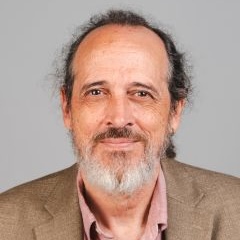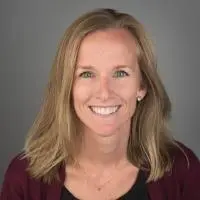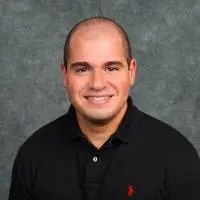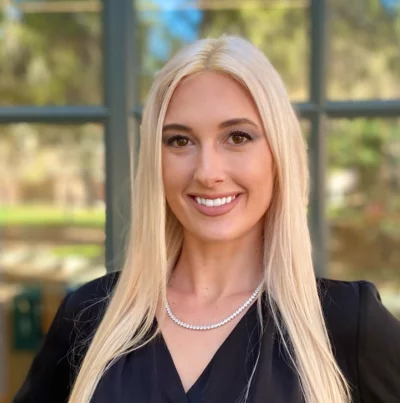$1000 Priority Submission Scholarship
Submit your completed application by Monday, Feb. 23 to receive a $1000 scholarship* toward your first course starting March 16 (Spring 2). Start your no fee application today.
Master of Science in Data Science
100% Online | Full Time or Part Time | No GRE or GMAT Required
View All Engineering and Computational Science Programs
Build Data Models and Communicate Insights
Merrimack’s online Master of Science in Data Science (MSDS) program develops well-rounded professionals with the technical, analytical and communication expertise needed to solve real-world problems using advanced data science. No experience or technical background is required.
Quick Facts:
100 percent online, live weeknight classes
Tuition under $23,000
Complete part time in 16–18 months
Concentrations in applied artificial intelligence and applied data science
No prerequisites or experience needed
No GRE or GMAT required
Financial aid eligible
Learn more about Merrimack’s M.S. in Data Science and Graduate Certificates.
What Skills Will I Gain With a Master’s in Data Science?
Merrimack’s M.S. in Data Science enables students to gain a broad and deep understanding of data science, what data scientists do, the types of problems data scientists address and the fundamental statistical techniques used to solve these problems. Below are some skills students acquire through this program and the industry tools they learn to master.
Hard Skills
- Coding for data manipulation and statistical analysis
- Data cleansing
- Predictive modeling
- Machine learning
- Artificial intelligence
Soft Skills
- Problem formulation
- Data governance
- Data security and privacy
- Data ethics
- Data visualization
- Data-driven storytelling (turning data into actionable insights)
Industry Tools:
- R
- RStudio
- Python
- Keras
- TensorFlow
- Tableau
- R Shiny
- SQL
- NoSQL
- Hadoop
- Spark
- DataBricks
Earn a Graduate Certificate Before Completing Your M.S. in Data Science
Build powerful skills you can apply immediately.
Upon completing three courses in the M.S. in Data Science program, you will earn a graduate certificate to showcase to current or future employers. You can choose from two options and earn your certificate in as few as 24 weeks.

Applied AI Certificate
Complete three of the four courses:
- Machine Learning and Artificial Intelligence
- AI for Text and Images
- Cloud-Based AI Systems
- Big Data: Hadoop and Spark

Data Science Foundations Certificate
Complete three of the five courses:
- Introduction to Data Science and Statistics
- R and Python Programming
- Visual Data Exploration
- Data Governance and Privacy
- Predictive Modeling

Quantum Computing Certificate
Complete three courses:
- Quantum Computing Applications
- Quantum Machine Learning
- Quantum Communication & Networks
Jobs in Data Science
According to the U.S. Bureau of Labor Statistics, employment of data scientists is projected to grow 36 percent through 2033 (nine times faster than the average for all occupations).
There are opportunities for skilled professionals in roles such as:
Business Intelligence Developer
$107,701
Average annual salary
Machine Learning Engineer
$119,456
Average annual salary
Big Data Architect
$133,049
Average annual salary
Sources: Glassdoor, May 2025
Over 200 graduates from the M.S. in Data Science program are leading successful careers at top employers.
Blue Cross Blue Shield | Capital One | Cigna | CVS Health | IBM | Indeed.com | Liberty Mutual Insurance | Microsoft | Staples | Thermo Fisher Scientific | Vertex Pharmaceuticals
Master of Science in Data Science Online Coursework
The Master of Science in Data Science equips students with the knowledge and skills necessary to build a successful career in the data science field.
Students may be eligible to waive up to eight credits of core courses and choose electives based on prior coursework and/or experience.
Core (8 credits)
If you do not have experience in statistics or coding, the foundational coursework gives you the framework needed to advance to more complex data modeling concepts. Students with prior experience will be automatically considered for waivers of the first two courses to replace them with additional electives.
In this course, students become familiar with the field of data science, its applications and use cases. They also learn relevant statistical topics with applications in data science. Credits: 4
Students learn to write and read Python and R programming codes for exploring, summarizing and visualizing numerical, categorical, date and text data. Credits: 4
Advanced Data Science (12 Credits)
These courses allow students to apply their knowledge to industry applications and gain a deeper understanding of an area of interest.
Students learn about data capture-related rights and responsibilities, data governance design and management, data security and privacy, information quality and the ethical aspects of data access, usage and sharing. In addition, they study operational and experiential aspects of data governance and differential privacy. Credits: 4
In this course, students study the fitting and validation of multivariate predictive models focused on estimation of continuous or categorical outcomes, emphasizing statistical bases of models. Credits: 4
Students learn automated pattern detection approaches focused on unsupervised and supervised learning, feature engineering, classification, regression and neural networks. Credits: 4
Applied AI Concentration (8 credits)
This concentration emphasizes the application of artificial intelligence, machine learning, large language models, image processing, deep learning, model training and evaluation, and data engineering to industry-specific challenges. Students develop a thorough understanding of the algorithmic foundations and applications of artificial intelligence and machine learning as they pertain to data mining, data engineering and analytics.
This course provides an introduction to machine learning on unstructured data sets, focusing on text and image data. More specifically, students learn the proper machine learning workflows and techniques for extracting critical insights and then apply their knowledge to real-world text and image data sets. The course includes an overview of these highly complex topics, focusing on the key intuition behind established approaches and hands-on application of techniques. Credits: 4
This course covers cloud-based AI systems using state-of-the-art, industry-standard platforms. The course also includes an overview of the process of creating Deep Learning AI systems on cloud systems and the data engineering aspects necessary to implement such systems. Students build an online, trained AI system as part of the course project. Credits: 4
Applied Data Science Concentration (8 credits)
This concentration focuses on using a broad range of data science techniques and methodologies to solve real-world challenges across industries. Students gain the technical expertise and practical experience to implement data science solutions in a variety of professional settings.
Required Courses (4 credits)
Learn to use industry-leading software to “tell the story of the data” by creating graphical summaries using Tableau and interactive dashboards using R Shiny. Credits: 4
Electives (4 credits)
Use analytical techniques to convert social media data into marketing insights, benefits and limitations of social media listening, creation of monitors, discussion of standard social media metrics, market structure and consumers’ perception of brand. Credits: 4
Apply analytical techniques including multiple regression and discriminant analysis to predict player performance and team outcomes as well as business models for sports franchises. Credits: 4
This course is hands-on analytics of real-world healthcare datasets. Students apply their modeling skills to real-life applications in the healthcare environment. Credits: 4
Students learn to write and read SQL and no-SQL queries. Students also develop an understanding of the design and function of relational and non-relational databases. Credits: 4
This course provides students with a comprehensive understanding of the big data processing foundation and techniques. Students gain an understanding of basic concepts of parallel computing, big data, Hadoop, MapReduce and Spark. They also develop skills to solve big data processing problems. Credits: 4
This course introduces students to machine learning on unstructured data sets, focusing on text and image data. More specifically, students learn the proper machine learning workflows and techniques for extracting critical insights and then apply their knowledge to real-world text and image data sets. The course includes an overview of these highly complex topics, focusing on the key intuition behind established approaches and hands-on applications of techniques. Credits: 4
This course covers cloud-based AI systems using state-of-the-art, industry standard platforms. The course also includes an overview of the process of creating Deep Learning AI systems on cloud systems and the data engineering aspects necessary to implement such systems. Students build an online, trained AI system as part of the course project. Credits: 4
Capstone Experience (4 credits)
In this capstone experience, students take a problem through the full data science lifecycle using data provided by the instructor or a data set from an employer or internship. The instructor provides data and requirements. Students must complete six courses from the MSDS program before taking this capstone course. Credits: 4
What Our Students Say
Accolades
No. 10 in ValueColleges’ 2022 Top 25 Best Value Online Big Data Programs
No. 15 in TechGuide’s 2024 Best Online Master’s in Data Science
No. 7 in TechGuide’s 2024 Most Affordable Online Data Science Master’s Degree Programs

NBA’s Senior Director, Basketball Strategy & Analytics, and Senior Data Scientist Teaches Advanced Sports Analytics
Josh Orenstein is the NBA’s senior director of Basketball Strategy & Analytics and senior data scientist. He has over a decade of experience in the sports industry as a data scientist. He analyzed 3D radar data that transformed performance evaluation and development in Major League Baseball. At the NBA, he uses advanced analytics to improve the competitiveness of the on-court product, evaluation of referees, and evaluation of collegiate basketball players. He is also a lecturer at Columbia University.
Learn From Experts in the Field of Data Science

David Sheets
Dr. Sheets was trained as a physicist but has worked for many years as an applied data scientist, overseeing collaborative, interdisciplinary teams to address a variety of questions. He has published scientific works in biology, entomology, forensics, paleobiology, physics, anthropology and art conservation. He co-authored a leading textbook in geometric morphometrics, a set of methods for carrying out hypothesis testing based on the shapes of non-human organisms. His current work focuses on measuring the performance characteristics of forensic firearms and handwriting examiners, as well as applying data science to the analysis of surface textures on art objects.

Randhir (Randy) Agarwal
Randhir (Randy) Agarwal currently leads the data engineering and data science teams at Samsung Electronics. He has over 25 years in the wireless telecommunications industry, including deploying Green-field wireless networks worldwide and fine-tuning them for optimal performance. Mr. Agarwal holds an M.S. in Data Science from Northwestern with a specialization in analytics and modeling, and a Bachelor of Engineering in Telecommunications from the University of Mumbai.

Torrey Walker DiPalma, M.Ed.
Torrey is our success coach for the Data Science & Analytics program and is very important to the overall student experience. Throughout your time working towards your degree, Torrey will help address many of the questions you may have outside the classroom. In doing so, Torrey will help free more of your time to concentrate on mastering the content that is so important to your program progression.
Torrey earned her B.A. in Mathematics from the College of the Holy Cross and an M.Ed. in Higher Education from Merrimack College. You will get to engage with Torrey from the time you are admitted until you graduate, allowing you to have a consistent point of contact as you work to achieve your goals.

Michael Dupin, Ph.D.
Michael Dupin, Ph.D., is the Head (and founder) of Data Science at C Space, a market research company where he leads the efforts on artificial intelligence. With more than twenty years of experience in data and statistical analytics, he is a self-confessed geek, data scientist, statistician, researcher, modeler, author, and sailor.
Prior to C Space, Mike held various roles within banking, where he led efforts such as macroeconomic stress testing, risk management, financial modeling, and statistical model validation. Before the corporate world, he was a research fellow at Harvard University modeling blood flow in tumors. He holds degrees in nuclear physics, instrumentation, and a Ph.D. in Computational Fluid Dynamics.

Katherine Geist, Ph.D.
Katherine Geist holds a Ph.D. in Biology with an emphasis in computational evolutionary genomics. Her research ranges from gene expression in social insects to migraine symptom tracking in multiple sclerosis patients, with big data at the core of her research.

Yamil Guevara, Ph.D.
Dr. Yamil Guevara is an expert in the fields of artificial intelligence, machine learning, and data science. He holds an MBA and two master’s degrees in artificial intelligence and machine learning as well as economics. He received his first Ph.D. in Organization and Management and is working on his second Ph.D. in Computer Science with an emphasis on artificial intelligence.
In addition to teaching, he has eight years of experience working as a data scientist, developing machine learning models using classical machine learning and deep learning neural network (DNN) algorithms to solve business problems. Dr. Yamil Guevara has authored “How to Increase Online Student Retention Utilizing Machine Learning” (University of Arizona Global Campus Chronicle, 2021), “Dangers of Artificial Intelligence” (Medium, 2022), “The Impact of Artificial Intelligence on Society” (Medium, 2022), and “The Utilization of Artificial Intelligence in the Classroom” (University of Arizona Global Campus Chronicle, 2021).

Christopher Healey, Ph.D.
Chris is a Data Science Lead at Schneider Electric — a multinational power electronics, energy storage, and building management company. He leads work in industrial applications of data science for predictive maintenance, intelligent alarm management, and efficient use of devices. He is deeply interested in robust decision-making through stochastic optimization and interpretation of machine learning models. A long-time member of INFORMS, he has authored several refereed papers and been granted multiple patents.
Chris received a Ph.D. in Industrial Engineering from Georgia Tech and a B.S. in Mathematics from William and Mary. Chris teaches Data Exploration for the Data Science & Analytics program. Chris teaches Visual Data Exploration for the Data Science program.

Jeremiah Lowhorn, M.S.
Jeremiah is a data scientist with nine years of experience in analytics. He is currently an adjunct faculty member in the Data Science & Analytics program. His interests include computer vision, natural language processing, time series analysis, and distributed computing. Jeremiah is fluent in R, Python, VBA, and SQL, and is interested in learning new programming languages.
In his leisure, he spends time with his wife Brooke and son Magnus. Jeremiah holds a B.S. in Financial Analysis from Ball State University, an M.S. in Analytics from Dakota State University, and is pursuing an M.S. in Information Systems and Ph.D. from Dakota State University. Jeremiah teaches R and Python programming in the data science program.

Josh Orenstein
Josh Orenstein is currently the NBA’s senior director of Basketball Strategy & Analytics and senior data scientist. He has over a decade of experience in the sports industry as a data scientist. He analyzed 3D radar data that transformed performance evaluation and development in Major League Baseball. At the NBA, he uses advanced analytics to improve the competitiveness of the on-court product, evaluation of referees, and evaluation of collegiate basketball players. He teachesAdvanced Sports Analytics at Merrimack College and is a Columbia University lecturer.

Peter Salemi, Ph.D.
Dr. Peter Salemi has over 10 years of experience in quantitative research, machine learning, and statistics in both academic and industry settings. As a data scientist at The MITRE Corporation, he works with several federal agencies ranging from the United States Department of Veterans Affairs to the Centers for Medicare & Medicaid Services. Dr. Salemi received his Ph.D. in Operations Research from Northwestern University, an M.S. in Operations Research from the University of California, Berkeley, and a B.S. in Mathematics and B.B.A. in Finance from the University of Massachusetts, Amherst.
His academic research interests lie at the intersection of machine learning and stochastic simulation, and Dr. Salemi’s research has been published in Operations Research, ACM Transactions on Modeling and Computer Simulation, and the Journal of Simulation. Dr. Salemi has also served as the co-chair of the Simulation Optimization track for the 2017, 2019, and 2020 Winter Simulation Conferences, and as a reviewer for several academic journals. His teaching interests are machine learning, data management, and statistics. As an adjunct faculty member at Merrimack College, Dr. Salemi is the instructor for both the Machine Learning and Text and Image Mining courses.

Kathryn Wifvat, Ph.D.
Kathryn Wifvat, originally from Minnesota, earned her B.S. in Mathematical Statistics and a B.A. in Applied Mathematics before completing a Ph.D. in Applied Mathematics at Arizona State University. With experience in data analytics and full-stack web and mobile app development, she is now the founder and CEO of an edtech startup, in addition to being an adjunct faculty member.
Student Support Resources
Students in the School of Engineering and Computational Sciences benefit from a dedicated success team.
Support includes:
- Access to coding LinkedIn Learning courses
- Personal student success coaching
- 1:1 tutoring
- 1:1 mentoring from faculty and program staff
Tuition and Financial Aid
$725
per credit*
32
credits
$23,200
tuition
*Tuition based on 2025-2026 academic year.
Tuition and fees are subject to change annually.
Additional program fees may apply.
Financial Aid
Merrimack College remains committed to providing one of the most affordable online M.S. in Data Science programs, ensuring students can access a high-quality, regionally accredited, private business school education at a competitive price.
As a graduate student, you may qualify for federal loans. We strongly encourage all eligible* graduate students to apply for federal financial aid, even if they don’t demonstrate an exceptional financial need. Graduate students also have the option of obtaining private loans and/or enrolling in an institutional payment plan.
Complete the Free Application for Federal Student Aid (FAFSA).
Merrimack College’s FAFSA school code is 002120.
*Certificate programs do not qualify for federal financial aid.
Tuition Assistance, Scholarships and Discounts
- Employer tuition assistance: Many employers offer tuition reimbursement — check with your HR department.
- Alumni discount: Double Warrior Scholarships are available to all Merrimack graduates. New alumni automatically receive a 33 percent savings on tuition if they begin a graduate degree program within two terms following graduation. All other alumni (i.e., those with an earlier graduation date) are eligible for a tuition discount of 25 percent.
- Partnership discount: Employees of affiliated companies may qualify for discounted tuition rates. Partners include Blue Cross Blue Shield, Citizens Bank, Mass General Brigham, New Balance and many more. Contact us or ask your employer whether your organization is an official partner with Merrimack’s online programs.
It’s Easy to Apply Online
A complete application includes:
- Online application (no fee)
- Official college transcripts from all institutions attended
- Resume or LinkedIn profile
GRE and GMAT scores are not required. Additional materials may be requested.
Key Dates and Deadlines
This program enrolls six times a year. Each term is eight weeks.
You May Also Be Interested In:
M.S. Business Analytics
EXPLORE PROGRAMApplied AI Certificate
EXPLORE PROGRAMData Science Foundations Certificate
EXPLORE PROGRAMQuantum Computing Certificate
EXPLORE PROGRAMMerrimack College
Accolades and Accreditation
At Merrimack College, we’re proud of our long history of providing quality degrees to students entering the job market. Our faculty are more than just teachers. We are committed to helping you grow — academically, personally and spiritually — so that you may graduate as a confident, well-prepared citizen of the world.
U.S. News & World Report | Best Regional Universities North (2026)
- Most Innovative Schools (No. 8)
- Regional Universities North (No. 38)
- Best Undergraduate Teaching (No. 20)
- Best Undergraduate Engineering Programs (No. 82)
(at schools where doctorate not offered) - Best Colleges for Veterans (No. 16)
- Best Value Schools (No. 52)
NECHE-Accredited
- Merrimack College is accredited by the New England Commission of Higher Education (NECHE).
Tell me more about Merrimack’s programs.
*This applies to new students entering the Spring II 2026 term. Does not roll over to subsequent terms. MBA, MED-SC, CMHC, MSN excluded. Not combinable with other offers (i.e. Double Warrior, Fellowship, Partnership Discounts, etc). For CSC 6000, credit will be applied to their second course.